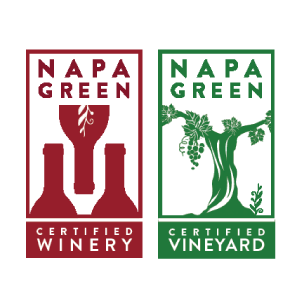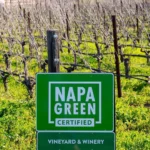Napa Green says it’s the 1st sustainable winegrowing certification program to require members to phase out herbicide
-
 SASHA PAULSEN | THE PRESS DEMOCRAT
SASHA PAULSEN | THE PRESS DEMOCRAT
- |
Napa Green will require its members to phase out the use of Roundup by 2026.
Napa Green, a nonprofit organization that provides certification services for regenerative viticulture and sustainable winemaking, will require its members to phase out the use of the herbicide Roundup and other glyphosate-based products by Jan. 1, 2026.
Noting that “eliminating the use of glyphosate is not a silver bullet,” Napa Green will also work with its members to phase out the use of all synthetic herbicides by two years later.
The group has developed a weed management toolkit and is planning a series of training workshops. It also established a fund to which growers can apply for support during the transition.
According to an announcement Nov. 14 from Napa Green, it is “the first sustainable wine-growing certification program globally (of which there are about 20) to require the phaseout of glyphosate and synthetic herbicides.
“While a few wine regions have made specific glyphosate-free/organic commitments, these have not been made as part of a whole-systems approach to sustainability and climate action.”
Monsanto developed and patented the glyphosate molecule in the 1970s and marketed it as Roundup from 1973. Its U.S. patent expired in September 2000, and Bayer acquired Roundup in 2018.
“Glyphosate is the most widely used herbicide in the world,” according to an article on its toxic affects, published by the National Institutes of Health’s National Library of Medicine. “It can persist in the environment for days or months, and its intensive and large-scale use can constitute a major environmental and health problem.”
“If not here, where? If not now, when?” Anna Brittain, executive director of Napa Green, said. “Our region and members have always been on the leading edge. Napa Green has rigorous standards for social justice and farmworker safety; herbicide phaseout is crucial to continued proactive leadership. We are no longer willing to defend the status quo on this issue.”
“There is a lack of public awareness that there is a suite of herbicides being used for agriculture, in part to try to address increasing weed resistance,” Brittain said. “In some cases, growers turn to two or three other herbicides to try to match the effectiveness of glyphosate, which can have equal or greater environmental and human health risks.”
Founded in 2004, Napa Green has certified 90 wineries and 25 vineyards. Among its members is Beth Novak, president of Spottswoode Estate in St. Helena. “We’ve been rallying our fellow winegrowers to eliminate herbicide and pesticide use,” Novak said. “It is well known that synthetic herbicides harm our soils and water, and our air. If we want to maintain our hard-earned notoriety for exceptional wines, then we must take this opportunity to act.”
Napa Green cites increased labor and equipment costs as “one of the main resistances to phasing out glyphosate,” but also notes that because “the costs of herbicides and fertilizers have risen dramatically, increased labor demands can be offset by reduced supply chain purchases.”
Ivo Jeramaz, vice president of vineyards and production at Grgich Hills Estate Winery in Rutherford, is an ardent proponent of regenerative organic farming who agrees that these practices can be cost-effective. According to an analysis by Brotemarkle Davis & Co. LLP accounting firm, the average annual per-acre cost of vineyard management in the Napa Valley is $14,800, with $3,800 in depreciation. At Grgich, they spend $11,000 per acre, with only $1,300 in depreciation due to the longer life of their vineyards.
“Regenerative practices are a proactive approach to farm health,” Jeramaz said. “If you’re healthy enough you don’t get sick — you’re able to fight off pests and disease. It’s a paradigm shift.”
“I see this as an important step for Napa Valley,” said Andy Erickson, board chairman of the Napa Valley Vintners and co-owner of Favia Erickson Winegrowers. “It makes perfect sense that our valley and community should be on the forefront of eliminating these herbicides and moving in a more sustainable direction. I hope this is just the beginning of an important movement.”
Napa Green will host a town hall to discuss the plans from 4:30-6:30 p.m. Dec. 7 at St. Supéry Estate winery in Rutherford. These include a limited opportunity for variances under exceptional circumstances. More information is available at napagreen.org/toolkit.
To see a full list of members visit: napagreen.org/participating-members
About napa green
About Napa Green: The Napa Green 501c3 is a global leader in sustainable winegrowing, setting the highest bar for sustainability and climate action in the wine industry. Napa Green facilitates whole system soil to bottle certification for wineries and vineyards, and provides the expertise, boots-on-the-ground support, and resources to continually improve. Learn more at https://napagreen.org/participating-members/.
Anna Brittain
Napa Green
+1 805-636-3329
email us here
Visit us on social media:
Facebook
LinkedIn
Instagram



